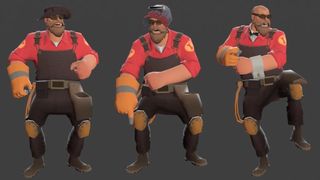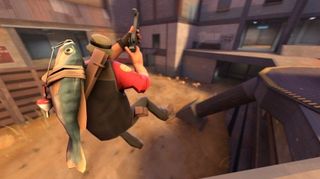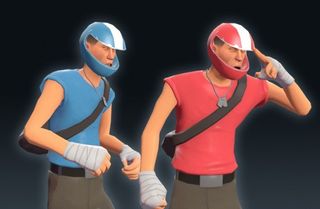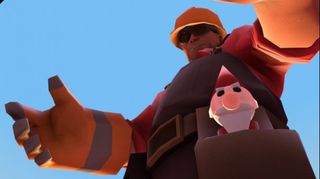Valve's Robin Walker on six figure item sales and the future of modding

Following my look at the Steam Workshop's biggest sellers earlier this week, I got a chance to put some questions to Valve's Robin Walker. He was one of the original developers of Team Fortress, back in 1996, and joined Valve soon after. His work as a modder informed his work at Valve, leading, in a roundabout way, to Team Fortress 2's current use as a platform to pay modders for their in-game work. In this pretty wide-ranging interview, I talk to him about the big numbers the modding scene generates, what makes a good item, virtual ownership, the future of free-to-play and Valve's evolving relationship with its community.
I know Valve aren't open with numbers, but is there a way we can talk about how much you've taken in revenue since going F2P?
The Mann Co store has now earned more than TF2 did via direct sales, if that helps put a scale on it.
How many items are submitted a day, and how many have you accepted?
TF2's receiving an average of 24-26 submissions a day. There's a ton of variability in how many we ship, because they're tied to the large TF2 updates. So in some months we ship 10, and in others we ship 30. But those numbers right there should show you what our biggest problem is right now: we're not shipping anyway near enough submissions. That makes the workshop too much of a gamble right now - there is high quality work being submitted that we're just not able to ship because there's too much of it. There are two main reasons for our slow pace.
The first is that the process for taking a submission and putting it into the game takes too long. It generally takes us a couple of days to take a submission, clean it up, validate it, set up the back-end database definitions for it, and so on. This is a problem we've solved in Dota's new importing tool (a single Dota artist managed to get 170 items from workshop to ready-to-ship in just 2 days), so the TF2 team is pulling that tool back into TF2 now.
The second is that TF2's items are a mix of weapons and cosmetics, and we've tried to stick to the rule that a weapon that looks different behaves different. So all those custom weapons need game design, and that adds much more time than the amount required just to ship the asset, because we need to playtest the design for a variable amount before we have enough confidence in the design to ship it. There's also the cost on players for the addition of a new gameplay affecting weapon in the game - even if we were able to ship the assets and playtested design for 100 new weapons in TF2 in a single update, the resulting chaos would be something to behold.
The biggest gaming news, reviews and hardware deals
Keep up to date with the most important stories and the best deals, as picked by the PC Gamer team.
So, once the importing tool is up and running in TF2, we hope that the rate at which we release cosmetic only items will dramatically increase. It's less clear that we'll significantly increase the rate at which we ship new gameplay affecting items.

And how many have you taken on board for the game?
Right now we're paying contributors for about 264 items in TF2. Depending on exactly what you decide constitutes an item, TF2 contains about 178 weapons and 550 cosmetics, so about a third of the items have been community built. That doesn't quite tell the whole story though, because many of those items were built by us before the Workshop existed. If you look at just this past year, for instance, we've shipped 59 community items versus 28 made by us (and another 36 promotional items where creation is shared across multiple developers).
It's been said the bigger creators are taking in "six figures". How many are now earning that level of income?
The top ten creators are all in that bucket. We're pretty happy with how there's a bunch of people making a good living off it. Compared to the monetary distribution of other places, like mobile applications, the workshop appears to be much less winner-take-all.
The game started out as a mod, and now modders can earn money from it. How cool is that?
Unbelievably cool, and personally rewarding to a level that defies logic. We get much more excited on the team looking at how much money contributors make than we do about how TF2 itself is performing. Many of us come from modding backgrounds, so we often find ourselves having conversations about how we're building systems we wish we'd had access to when we started out. The idea that the system is also allowing professionals in less rewarding jobs to leave and fund their own indie games is pretty exciting too.
Can you tell us how you split the revenue?
Yep, we offer contributors 25% of the sales of their items.

What's your favourite story from the community making money in this way?
It's hard to decide between two of my favourites. The first is the 14 year old kid who got to present a $40,000 check to his parents. The second is a fellow who wanted to make models at a games company, but ended up having to do QA instead. So at nights he contributed models to TF2, and ended up earning more doing that than he did at his "official" games industry job.
What makes a good item? What are you looking for?
Defining what people should submit to the Workshop is a bit of a dance. On the one hand, we want to provide them with a solid foundation for what kinds of things we're willing to ship, but on the other hand, we genuinely want them to surprise us. Part of the value of large communities attacking a problem is that they can search the creative space much faster than we can, because there's simply a lot more creators involved. Some creators focus on building high quality versions of item types that already exist, others focus on trying to find the next kind of thing that players will want.
What's your favourite contribution? This is mine .
Gah, too many to choose from. I still have a soft spot for LaroLaro's original Soldier Tank Buster set . It was one of the first item sets that we sold in the Mann Co store, and when I saw it I thought it was clear this whole Workshop thing was going to work. I thought they looked great, fit the style, but were still distinct from our existing items.
Do players craft more or buy more?
Like all F2P games, the bulk of our players are playing for free, and crafting's one of the primary ways we satisfy their desire to get specific items. So it's still a huge source of new items entering the economy. But we don't think of it as competing with purchasing, it's simply satisfying other customers, many of whom couldn't spend money even if they wanted to. If you play a bunch and craft your item drops into things you want, then you're a happier customer for it, and we think your happiness will pay off for us in the long run. We don't have a zero sum approach where we think if you crafted something, that means we lost the money you would have paid for it, so we don't hold discussions like, "How can we get all these crafters to stop crafting and start buying?"

Regarding in-game items, where does ownership sit? People are buying things in-game, very specifically.
It's a lot like a game on Steam. With a game, the developer or publisher owns the intellectual property, and Steam users get a license to use the game. With in-game items, the creator (whether that's Valve, or a Workshop contributor) retains ownership of the IP, and people who buy an item get a license via Steam to use it in the game.
It seems like if they've invested money in items then they should be protected. Have you thought about that?
Sure. Items have become increasingly important to people's enjoyment of the game. We've worked to increase the value of items to users by expanding the things people can do with them, like crafting, and enabling exchange through trading. We try to avoid doing anything that might make them not trust us in the future with their items.
What if TF2 needed to go away for some reason, how would Valve consider their investment people have made in their item-sets?
We tend to think of them as fun features of the game, and not as an "investment”. The items are really only useful within the game, and we don't have plans for TF2 to go anywhere.
People are no longer surprised at how much F2P can earn, and they're no longer surprised at the quality of the games you can get. What *is* surprising you about F2P?
I'm surprised by the degree of confidence game developers seem to have in the current F2P design approaches, both in game design and monetization design. Given that it's something that's so new to the industry, it seems unlikely that the most optimal design approaches have already been found, and yet we're already seeing games lifting each other's monetization designs wholesale. At Valve we've spent the past 2 years exploring this design space, and constantly feel like we're only just starting to understand it.

Is the future of Valve games now tied to a level of community involvement? And if so, what's needed to help people get more involved?
I'm always nervous about making blanket statements, because the nature of game development is that everything has to make sense for the specific game you're building. The right way to involve the community in TF2 won't be exactly the same as it is in Dota 2, and it's likely significantly different to the right way for Half-Life or Portal. But perhaps the core philosophy that we've come to believe, after supporting TF2's for the past four years, will remain true across all these products: that the right way to approach community involvement is not in a developer -> customer relationship, but more as a collaborative approach, where there are some parts of the product that we'll build, and other parts that the community will build, and that the lines between those parts will continually shift.
To help more people get involved, we need to address the two biggest problems we currently have. The first is the one I talked about above, that we're just not able to keep up with the amount of content the community is creating. The second is that there are types of value the community is creating that we haven't built systems to handle. Without a system, the distribution of the value they're creating isn't there, and that means it's hard for other players to find their creation and enjoy it. Even once players do find and enjoy it, there's no way to for them to pay back the community creator. Without that loop in place, creators aren't getting the feedback they need to improve, nor are they getting the financial reward they might need to be able to spend as much time creating as they'd like. You can see this in things like TF2's maps, where there's no good system for players to find new maps, or pay for the ones they feel deserve it, and there's no great way for mapmakers to receive the feedback they need to get better.
Most Popular





